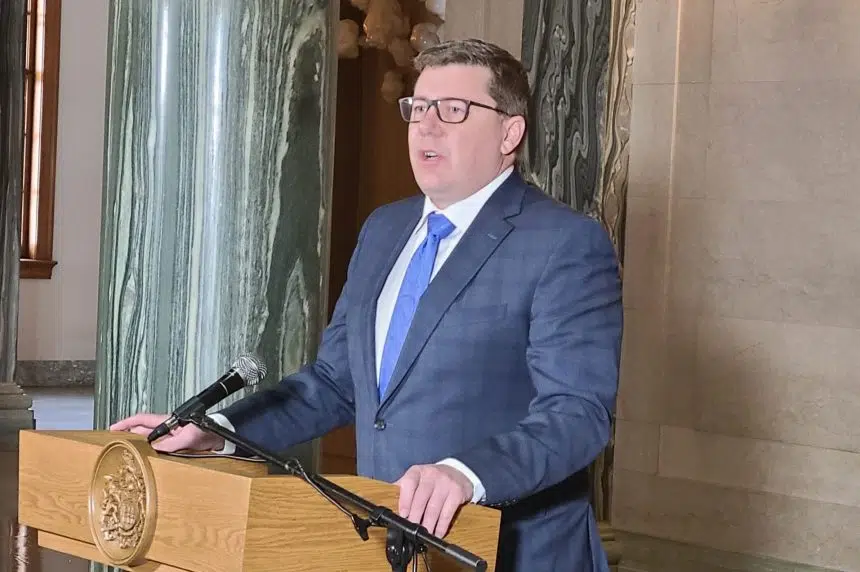As a protest continues in the nation’s capital, Premier Scott Moe doesn’t believe Ottawa should have invoked the Emergencies Act.
“It’s certainly not necessary and certainly is an overstep,” Moe said during a media conference Wednesday. “When you look at the bridge in Windsor being cleared by a very capable Ontario police force, (the) Windsor police force and I suspect some RCMP involvement, the Emergencies Act was not needed for that.”
Protests in Ottawa have gone on for weeks now and blockades across the country went up at important border crossings and blocked trade with the United States — Canada’s largest trading partner.
While the blockade at the Ambassador Bridge in Windsor ended with police enforcement, ones at Coutts, Alta., and Emerson, Man., ended days after the Emergencies Act was implemented.
Prime Minister Justin Trudeau invoked the act on Monday after consulting with premiers of the provinces and territories. Following the call, Moe and some other premiers said they hoped it would only be invoked in provinces that requested it.
“Premiers have said the Emergencies Act is not necessary to disperse those crowds that may be acting in an illegal way. The tools are already there and the police need to utilize those tools,” Moe said.
Moe said he’s not aware of the precise details but presumes there are laws being broken during the ongoing Ottawa protest.
“They shouldn’t be and they should be enforced by the police there. There is a role for the federal government to help in de-escalating this situation. Public health measures, in particular the vaccine mandate with no negative test option, they should provide some guidance on when that vaccine mandate is going to go by the wayside,” Moe said.
“That would go a long ways in de-escalating not only the situation in Ottawa but the conversations we are hearing in communities across this nation and across this province.”
Moe, Alberta Premier Jason Kenney, and 16 United States governors signed a letter calling on Trudeau and U.S. President Joe Biden to reinstate vaccine and quarantine exemptions for cross-border truckers.
“We are deeply concerned that terminating these exemptions has had demonstrably negative impacts on the North American supply chain, the cost of living, and access to essential products for people in both of our countries,” the letter read.
“The timing of your decision to terminate the vaccine and quarantine exemptions could not have been worse, as North America already faces grave supply chain constraints. These constraints, combined with increasing inflation, place significant burdens on the residents of Canada and the United States.”
The letter added that transportation associations have said the absence of the exemptions will force many drivers out of the trucking industry.
The letter appears below.
No changes coming to Saskatchewan COVID strategy
The premier also said there aren’t any plans to change how the government is handling COVID-19 data, having shifted to a weekly reporting model.
“As we find our way through this, we are aware that there are staffing challenges with the Omicron variant being there and staffing shortages due to employees that are required to self-isolate,” Moe said.
“We intend to use our entire provincial (health) capacity. We are about 86 per cent in our non-ICU capacity (that) is being utilized today. That’s down from 91 per cent last week.”
Moe said health officials are investing in additional ICU beds and reducing surgical wait times.
“We need to continue to invest in our health-care system and in the people who work in our health-care system,” Moe said.
Moe said private sector employers are allowed to do what they like when it comes to requiring masks and proof of vaccination for employees, but they could open themselves up to potential legal action.
“That’s a decision private business owners will have to make. What we have done and what we encourage all to do, including private business owners and those of public places, is to truly get back to where we were pre-pandemic in respect to open and free access to all our public facilities and private facilities as well,” Moe said.
Moe said the Provincial Emergency Act is still in effect so the government can direct health-care staff throughout the provincial system.











